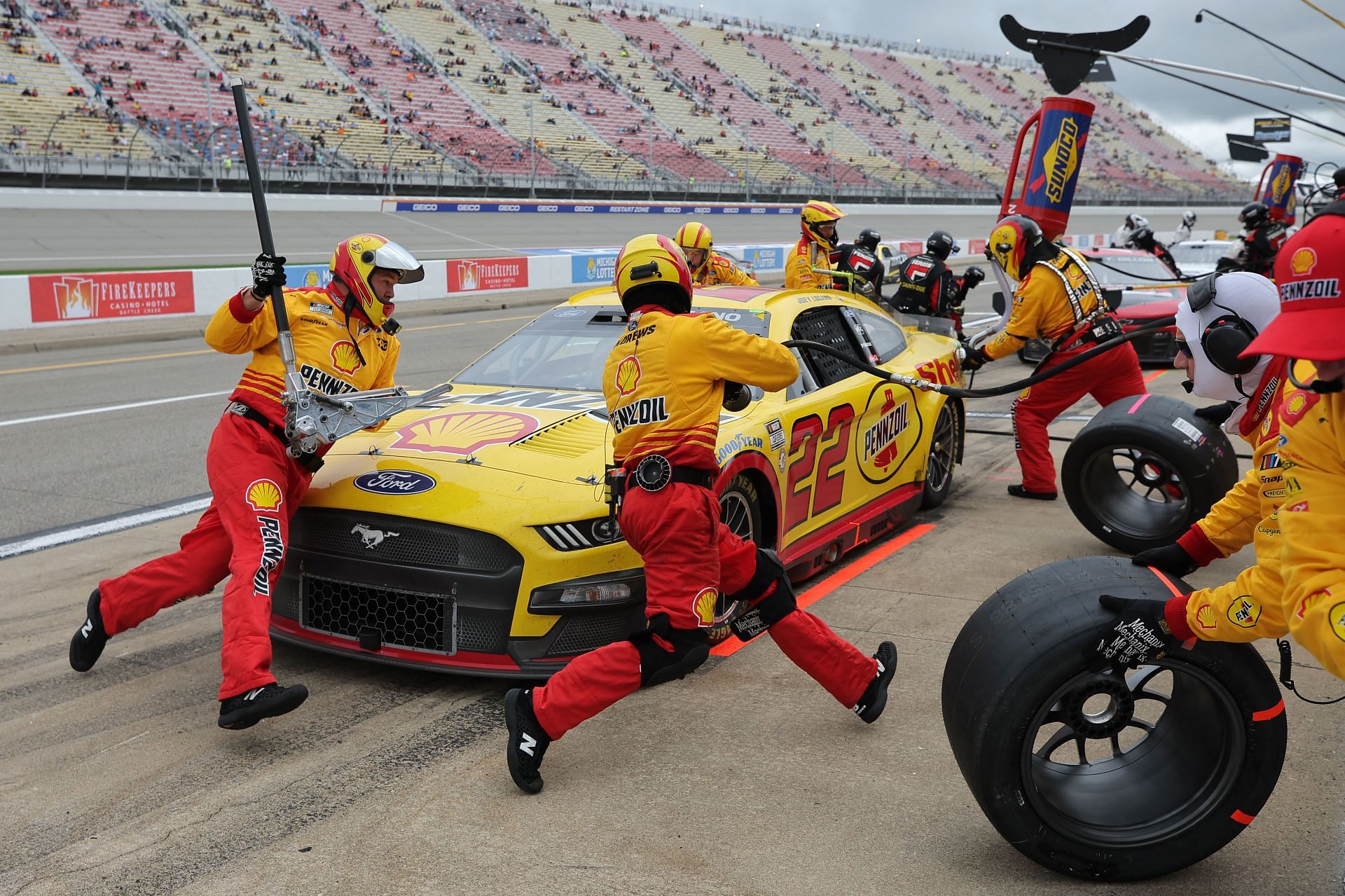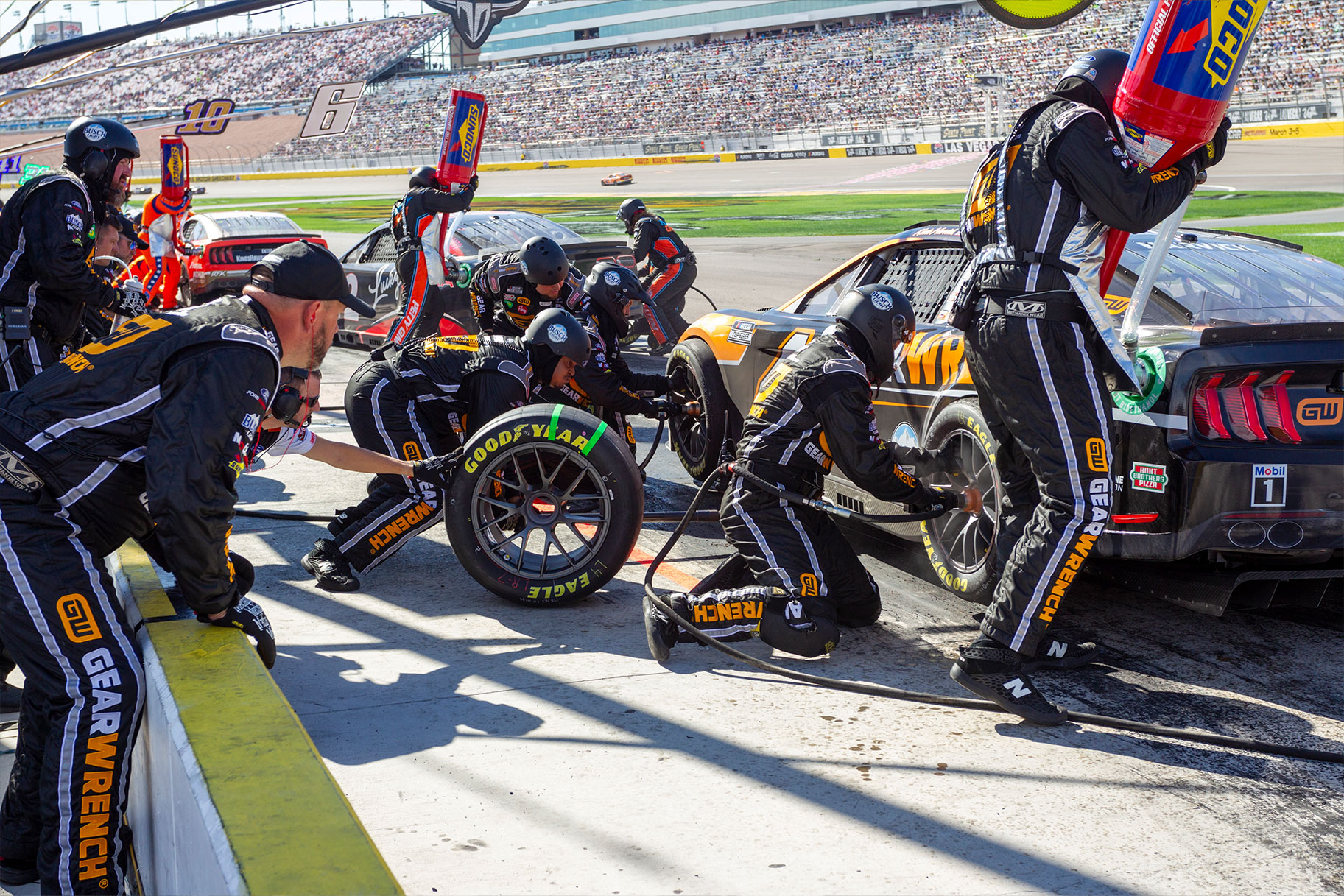NASCAR Pit Stop Crew Salary: The Untold Story Behind The Big Bucks
When you think of NASCAR, the first thing that comes to mind is probably the roar of engines, high-speed chases, and those iconic race cars tearing up the track. But behind every successful driver is a team of unsung heroes—the pit stop crew. These guys are the real deal, working under immense pressure to get the car back on the track in record time. And guess what? They don’t do it for free. Today, we’re diving deep into the world of NASCAR pit stop crew salaries, uncovering the big bucks and the hard work that comes with it.
Now, before we get too far into the nitty-gritty, let’s set the stage. The pit stop crew is more than just a bunch of guys changing tires and filling up gas. They’re a finely tuned machine, each member with a specific role that requires years of practice and dedication. Think of them as the ultimate support system for the driver, and their salaries reflect the importance of their role in the race.
But why should you care about NASCAR pit stop crew salaries? Well, if you’re a fan of the sport, understanding the financial side adds another layer of appreciation for the teams. Plus, if you’re thinking about joining the world of NASCAR, knowing what’s in it for you financially might just be the push you need to take the leap. So, buckle up, because we’re about to break it all down for you.
- Christmas Capricorn How The Most Practical Zodiac Sign Celebrates The Festive Season
- 6 Flags California Hours Your Ultimate Guide To Thrills And Adventures
What Exactly Does a Pit Stop Crew Do?
Before we talk numbers, let’s break down what the pit stop crew actually does. The crew consists of several key roles, each with its own set of responsibilities:
- Tire Changers: These guys are responsible for removing and replacing the tires. They have to do it fast—like, really fast.
- Tire Carriers: Their job is to bring the new tires to the car and help the tire changers do their thing.
- Jackmen: The jackmen lift the car so the tires can be changed quickly.
- Fuelers: They’re in charge of refueling the car during the pit stop.
- A-Frame and Front Tire Carrier: These roles involve stabilizing the car and helping with the front tires.
Each member of the crew has to work in perfect harmony, and they’re often timed down to the second. A successful pit stop can mean the difference between winning and losing a race.
Why Are Pit Stop Crews So Important?
Think of the pit stop crew as the lifeline for the driver. Without them, the car wouldn’t be able to refuel or get new tires when needed. And in a sport where seconds matter, their efficiency can make or break a race. The crew’s ability to perform under pressure is what sets them apart, and it’s no wonder they’re compensated accordingly.
- Magic Johnson Son Age The Untold Story Of Family Legacy And Basketball
- Unveiling The Capacity Of Ou Football Stadium A Deep Dive Into The Heart Of College Football
Average NASCAR Pit Stop Crew Salary
So, how much do these guys make? On average, a NASCAR pit stop crew member can earn anywhere from $50,000 to $150,000 per year. But here’s the kicker—the top performers, especially those on championship-winning teams, can earn significantly more. Some of the elite crew members can pull in salaries upwards of $200,000 annually.
Now, you might be wondering why there’s such a big range. Well, it all comes down to experience, the team they’re working for, and their individual performance. Just like in any other profession, the more skilled and experienced you are, the more you can command in terms of salary.
Factors Influencing Pit Crew Salaries
Several factors play into how much a pit crew member earns:
- Experience: The more years you’ve spent perfecting your craft, the higher your salary is likely to be.
- Team Reputation: Top-tier teams with a history of success tend to offer higher salaries to attract the best talent.
- Role on the Crew: Some roles, like the tire changer or jackman, might command higher salaries due to the complexity and pressure involved.
- Performance: If you’re consistently delivering fast pit stops, you’re more likely to earn a higher salary.
Breaking Down the Numbers
Let’s take a closer look at the salaries for different roles within the pit stop crew:
Tire Changer Salary
Tire changers are often among the highest-paid members of the crew. With salaries ranging from $75,000 to $150,000 per year, these guys are the ones under the most pressure during a pit stop. They have to work quickly and accurately, often using specialized tools to get the job done.
Tire Carrier Salary
Tire carriers earn slightly less than tire changers, with salaries typically ranging from $50,000 to $100,000 per year. Their role is crucial, as they ensure the new tires are in place and ready for the tire changers.
Jackman Salary
Jackmen also earn salaries in the $75,000 to $150,000 range. Their job requires strength and precision, as they have to lift the car quickly and safely.
Fueler Salary
Fuelers earn salaries that typically fall between $50,000 and $120,000 per year. While their job might seem straightforward, it requires a steady hand and attention to detail to avoid any spills or accidents.
How Do Pit Crew Salaries Compare to Other Motorsports?
When you compare NASCAR pit crew salaries to those in other motorsports, like Formula 1 or IndyCar, you’ll find some interesting differences. In Formula 1, for example, pit crew members can earn salaries upwards of $250,000 per year, thanks to the global popularity and higher budgets of the sport. However, NASCAR’s salaries are still quite competitive, especially when you consider the level of skill and precision required.
It’s also worth noting that the cost of living and regional differences can impact how far these salaries go. For example, a crew member working for a team based in Charlotte, North Carolina, might find their salary goes further than someone working in a more expensive city.
What About Bonuses and Perks?
In addition to their base salaries, pit crew members can also earn bonuses and perks. These might include:
- Performance bonuses for fast pit stops.
- Championship bonuses for teams that win the series.
- Travel allowances and accommodations when the team is on the road.
These extras can add up, making the total compensation package quite attractive for top talent.
The Road to Becoming a NASCAR Pit Crew Member
So, how do you become a NASCAR pit crew member? It’s not as simple as just showing up and saying, “Hey, I want to change tires.” Most crew members start out in lower-level racing series, honing their skills and building their reputation before moving up to NASCAR.
Many also attend specialized training programs or work in related fields, like automotive repair or fitness training, to develop the skills needed for the job. Physical fitness is a big part of the equation, as pit crew members need to be in top shape to handle the demands of the job.
Training and Preparation
Training for a pit crew member is intense. They spend countless hours practicing their specific role, often using simulators to mimic the conditions of a real race. They also participate in team-building exercises to ensure they can work seamlessly with their fellow crew members.
And let’s not forget the mental preparation. Pit crew members have to be able to stay calm under pressure, think quickly on their feet, and adapt to changing situations. It’s not just about physical skill; it’s about having the right mindset to succeed in the high-pressure world of NASCAR.
Challenges Faced by Pit Crew Members
Being a NASCAR pit crew member isn’t all glitz and glamour. There are plenty of challenges that come with the job:
- Physical Demands: The job is physically demanding, requiring strength, speed, and endurance.
- Pressure: Every pit stop is a high-stakes situation, and mistakes can cost the team dearly.
- Travel: Pit crew members often spend long periods on the road, traveling from race to race.
Despite these challenges, many crew members find the job incredibly rewarding. The thrill of the race, the camaraderie with their team, and the satisfaction of a job well done make it all worth it.
Conclusion: Is It Worth It?
So, is being a NASCAR pit crew member worth it? For many, the answer is a resounding yes. The salaries are competitive, the job is exciting, and the sense of accomplishment is unparalleled. But it’s not for everyone. It requires a unique combination of skills, dedication, and passion for the sport.
If you’re considering a career in NASCAR pit crew, take the time to weigh the pros and cons. Talk to current and former crew members, attend races to see the action firsthand, and consider your own strengths and weaknesses. And if you decide to take the plunge, remember that the road to success won’t be easy—but the rewards can be well worth it.
Now, it’s your turn. Do you have what it takes to be a NASCAR pit crew member? Share your thoughts in the comments below, and don’t forget to check out our other articles for more insights into the world of motorsports!
Table of Contents
- NASCAR Pit Stop Crew Salary: The Untold Story Behind the Big Bucks
- What Exactly Does a Pit Stop Crew Do?
- Why Are Pit Stop Crews So Important?
- Average NASCAR Pit Stop Crew Salary
- Factors Influencing Pit Crew Salaries
- Breaking Down the Numbers
- How Do Pit Crew Salaries Compare to Other Motorsports?
- What About Bonuses and Perks?
- The Road to Becoming a NASCAR Pit Crew Member
- Challenges Faced by Pit Crew Members
- How Far Apart Is Russia From Alaska The Ultimate Guide To Understanding The Distance
- Snoop Doggs Son Julian The Rising Star In The Music Industry

The Comprehensive Guide To Understanding Average Pit Crew Salary In NASCAR

How Do You NASCAR Pit Crew Member? USA Insider

The grueling life of a NASCAR pit crew member